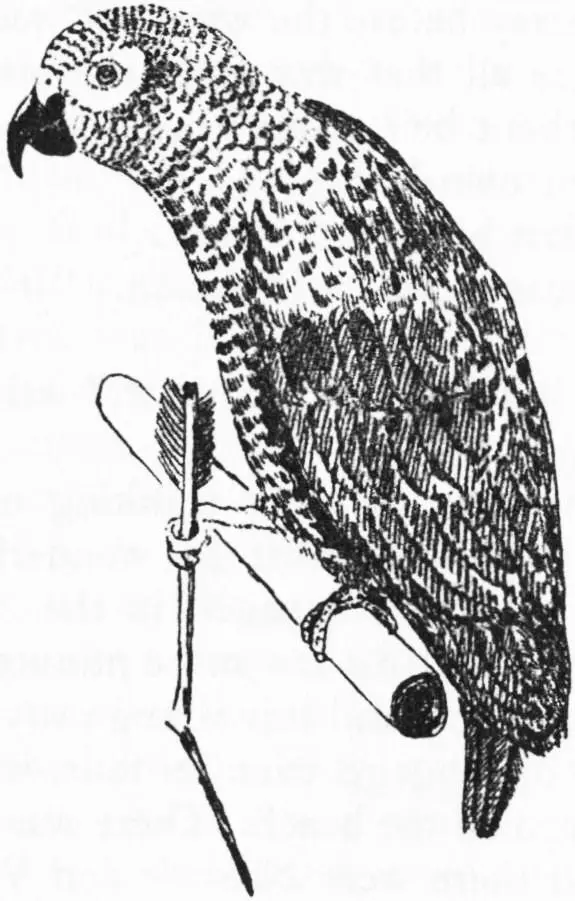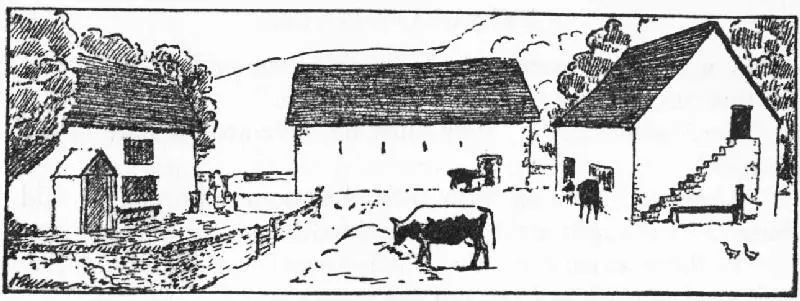“That was the Hen all right,” said Nancy. “Now for the Chicken.”
But they never saw the Chicken. “Steamer buoy right ahead,” was the next thing called by the look-out.
John put the tiller hard a-port and they passed close by the high floating framework of the steamer buoy.
“We’ve missed the Chicken then,” said Nancy. “The buoy marks the fairway south of both the rocks. Listen!”
Over the water came the noise of hammerings, and the chug, chug of a small petrol engine, and the rattle of shafting, and every now and then the long “woosh” of a circular saw slicing through a plank.
“The boatyards,” said John, “where I was with Captain Flint. Let’s go and have a look at Swallow.”
“We simply mustn’t,” said Susan, “with those two waiting up at Swallowdale.”
Peggy rowed on.
The tall mast of a racing yacht at her moorings towered above them.
“The Polly Ann,” said Nancy. “She’s moored close by the Point. We ought to see it in a minute now. There it is. Done it. We’re across. It’s easy enough now. Come on, Peggy, swop places. I’m going to row.”
John took the compass now, while Peggy steered. They kept close along the shore by the Point, and then rowed across the mouth of the Holly Howe bay seeing nothing until the Peak of Darien loomed high and dark out of the fog.
“Now we’ll row across the lake. South-west’s the course.”
“Come on and take the compass, Captain Nancy,” said John. “She’s your ship. And I’d much rather row.”
Again there was a change of places, and again something known and certain was left behind as the Peak of Darien vanished astern of them while they moved out into the unknown where the only certain thing was the little needle in Nancy’s pocket compass, pointing always to the north. John rowed, stroke after stroke, as regular as an engine, while Nancy watched her compass, and Peggy, at the tiller, watched Nancy’s pointing hand. It was a long blind passage in the fog, south-west across the lake, but they made the farther shore at last, after which they had only to follow it until they should come to Horseshoe Cove. John rowed steadily on, and presently they were startled to find that they were already in the narrow channel between Cormorant Island and the mainland. They were close under the little rocky island before they saw it, for they were watching the shore on the other side of the boat. The cormorants were startled too. There they were on the dead tree, grey shadow birds in the fog. Neither Swallows nor Amazons had ever seen them quite so near before, but, as Peggy said, they were so dim in the fog that they might as well have been a hundred yards away.
And then, when the shadow birds had vanished with the shadow tree on the shadow island, a ripple showed on the water under the fog, and suddenly they could see the island again, and trees well back from the shore, and the headlands of Horseshoe Cove, and Wild Cat Island at the other side of the lake, and the lower part of the woods, and the hills at the foot of the lake. The fog was lifting, and John stopped rowing for a moment, and they looked back to the islands by Rio as the fog rolled away before the wind. It was hard to believe that they had come all that way from the other side of these distant islands without being able to see more than two boat’s-lengths out of their own little ship.
“Let’s sail the last bit,” said Nancy.
“It’s so very near now,” said Susan. “It’ll be quicker to row.”
“Your mate’s thinking of her crew,” said Nancy. “But never mind.”
John rowed on. He, too, was thinking now of the able-seaman and the boy, who must be wondering up there in Swallowdale how they had managed in the Amazon with the fog so thick on the lake. In a few more minutes he was pulling in between the headlands, and this strange voyage was done.
There was a lot of baggage, even for four, when Amazon had discharged her cargo on the beach. There was the big tent and its poles, and then there were Nancy’s and Peggy’s sleeping-bags, which were bigger and heavier than those which were stuffed into the knapsacks of the Swallows. There was the kettle and the milk-can, and the little barrel that had to be slung from an oar. Then there was that pie, too, a kind thought of cook’s, and very good to eat, but a dreadful thing to carry.
“It’s no good,” said Captain Nancy. “We’ll have to make two journeys. Just take what you can manage comfortably.”
“We’ll have tea and then we’ll run down and bring up the rest,” said John.
“It’s late for tea now,” said Susan. “We’ll have tea and supper both together, as soon as we get up to Swallowdale. Titty’s sure to have some water boiling.”

Chapter XXXIII.
The Empty Camp
Table of Contents

Susan for a long time had been worried by thinking of the able-seaman and the boy alone in Swallowdale. They would be wondering what had happened to the Amazon. Titty would be imagining her run down by a steamer in the fog. Roger would be hungry. Would Titty think of making a meal for him, or would she go and think it was the proper thing to wait for the captain and the mate. You never knew. And then, when Nancy and Peggy, with their tent rolled up and carried on its tent poles, climbed up out of the wood, there came the first hint that things might be far worse than even her most native fears.
“There’s no smoke,” said Captain Nancy.
“Those two young donkeys haven’t lit the fire,” said Peggy.
Susan and John, heavily laden, hurried up out of the trees. It was true. Not the faintest wisp of smoke was blowing from Swallowdale.
“Had they any matches?” said Captain John.
“No,” said Susan, “but there were plenty in Peter Duck’s cave. Titty was there when I stowed the things. She must know where they were put. If they’ve gone and waited for us all this time, they must be nearly starving.”
“Yes,” said Peggy, “they must be. We are, in spite of the fudge.”
“They had nothing with them but some chocolate,” said Susan. “I thought we’d all be back and have tea together.”
“Is there anyone on the watch-tower?” said John. “Just half a minute while I get out the telescope.”
But Susan hurried on. This was no time for waiting. Nor did Nancy and Peggy want to stand still with the weight of the tent on their shoulders as well as their crammed knapsacks. They wanted to hurry on to Swallowdale and unload.
“Duffers,” said John, a little uneasily, shutting up the telescope with a click, and running after the others. “They haven’t lit the fire and they haven’t even got anybody looking out.”
“Perhaps they’re busy putting up your tents,” said Peggy.
“That doesn’t take two minutes,” said Susan, “and we’ve been ages, because of that fog.”
“What about giving them one of your owl calls?” said Captain Nancy.
John took a deep breath and let it out in one of the best owl calls he had ever made. The long “Tu whoooooooooooooo” was enough to frighten every mouse on the moor. But it brought no answer out of Swallowdale.
He tried again, but his owl call was not such a good one. He caught sight of Susan’s face, just while he was making it. He knew at once that she was feeling much too native for owl calls.
Again there was no answer.
Читать дальше














